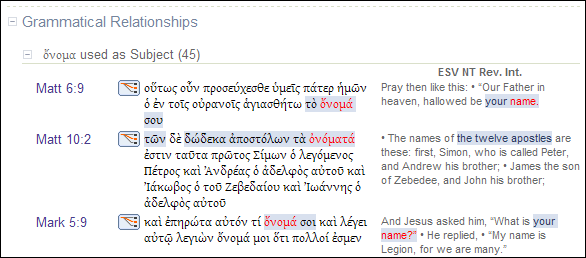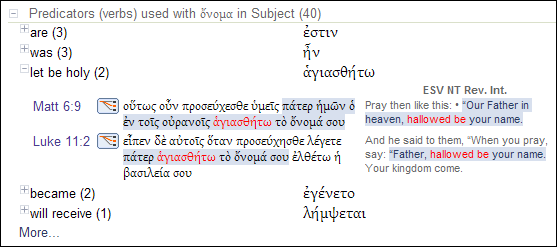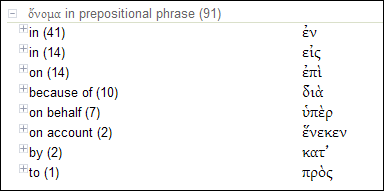One of my favorite features in the upcoming Logos Bible Software 3.0 has to be the Bible Word Study report. And my favorite aspect of the Bible Word Study report has to be the Grammatical Relationships section of the report.
The Bible Word Study report is intended to help explore how a particular word is used in the Bible. English, Hebrew or Greek, just type it in and the Bible Word Study report goes to work. Even better: right-click on a word in an English text or a morphologically tagged Greek or Hebrew text, and it goes to work.
Because the report is intended to gather all sorts of information about word usage, and because we have these oh-so-groovy syntax databases we’ve been working on, it seemed natural to do something to explore word usage by syntax inside of the Bible Word Study report. So that’s what we’ve done. And wow, is it cool!
If your eyes have glazed over in the past when we’ve blogged about syntax, then this feature is for you. Instead of requiring you to fully understand syntactic structure issues to start asking questions about the syntax of the text, we’ve done the heavy lifting. Each syntax database (the Andersen-Forbes Hebrew Bible database and the OpenText.org Syntactically Annotated Greek New Testament) has its own approach and benefit, so Logos has created syntax queries that can be applied to general words in the text. Essentially, we ask questions of every word. If the syntax database returns answers to a question, then the answers are reported.
(Before I go too much further, I should say that we’re still tweaking the report display, so the stuff you see here could change between now and the time Logos Bible Software 3.0 ships)
It goes like this. You say something like “tell me about the Greek word ?????” (which is the word typically translated name). Let’s say you did this with a right-mouse click on the word in Matthew 6.9 and selecting “Bible Word Study: ?????” from the right-click menu.
Instantly the Bible Word Study report springs into action. And in the Grammatical Relationships report, it asks questions like:
- Is ????? ever used as a subject?
- What sorts of verbs are used when ????? is used as a subject?
- Is ????? ever used in a prepositional phrase? If so, what are the prepositions that ????? is used with?
That isn’t a comprehensive list, there are other things that are asked of the text. For ?????, there are a lot of answers. According to the OpenText.org annotation, ????? occurs in the subject of a clause as a head term 45 times. You see this in Grammatical Relationships and then can expand the section if you’d like to follow up on a few:

This list gives you a starting point to examine further. You see how the word is used as a subject in instance like Mk 5.9, “My name is Legion” and Mk 14.32, “They went to a place called Gethsemane”. And you also run across stuff like Ac 3.16, “and by faith in his name, his name itself has made this man strong”.
If you’re interested in what sorts of verbs are used with ????? in the subject, there are a number of them. Of the 45 times that ????? is subject, there are 40 instances that occur with a predicator. And there are all sorts of verbs used:

There are words you might expect (?????) but you’ll also see ?????????, glossed as let be holy. And the two instances listed there are from Mt 6.9 and Lu 11.2, instances of parallels of the Lord’s Prayer, “hallowed be your name”.
The lists are (at present, anyway) sorted by number of occurrence. So the most frequent instances are at the top of the list. This is helpful for things like prepositions. Yep, there are 91 instances of ????? as the object of a prepositional phrase; there are eight prepositions used. The most frequent is ??, with 41 of those instances:

So “in his name” or “in the name” using the preposition ?? is much more frequently used than any other preposition. Scrolling down the list of ?? usages, you see that the Gospels use ?? with ????? as the prepositional object solely of the name of God or the name of Jesus Christ. This holds true for the instances outside of the gospels with the possible exception of Ac 7.4 (“by what name did you do this?”) but the question is answered in v. 10 with ” … by the name of Jesus Christ of Nazareth”.
Evaluation of other prepositions shows that many of the instances have their majority of use with ????? as describing the name of Christ or of God; some aspect of the divine name. There are other instances (Mt 10.14, “in the name of a prophet”; 1Co 1.13, “in the name of Paul”) but you can easily see the trend. Perhaps this is meaningful, perhaps it is not. But the information has been retrieved and laid out for you to browse, examine and consider as you study how a particular word is used in the New Testament.
And that’s really what we’re trying to do with the Bible Word Study report examine available resources likely to provide information, then retrieve and lay out information that you can use as a platform for learning more about the word under study. If the word is Greek or Hebrew, that includes syntax information.
Another way to put it: Facilitate Serendipitous Discovery.





